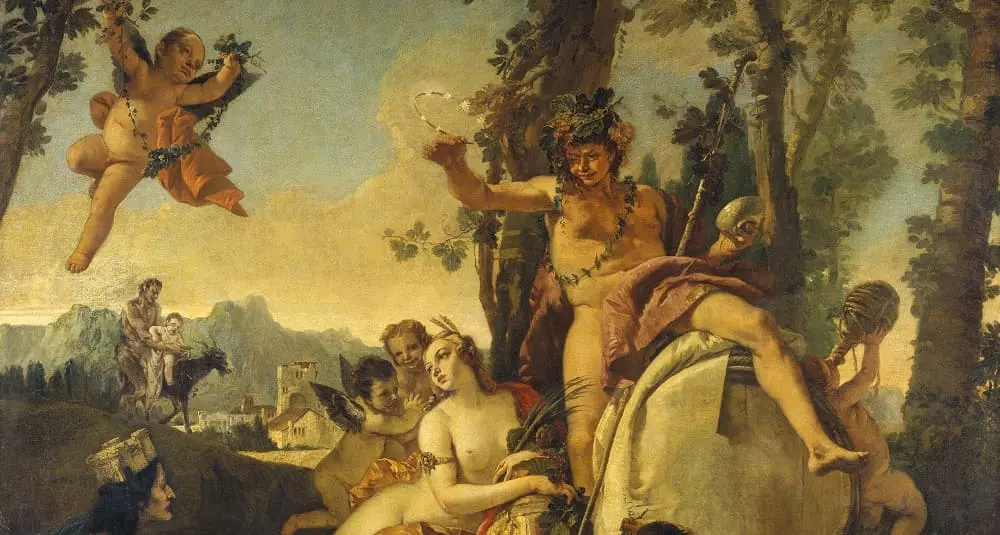What are Bacchus’ attributes?
Last Updated:
In Roman mythology, Bacchus is the god of wine, drunkenness, celebration and fertility. He corresponds to the Greek god Dionysus. A complex divinity, at once joyful, mysterious and sometimes dangerous, Bacchus is often depicted surrounded by symbolic attributes that convey his exuberant, sensual and divine nature.
Bacchus’ first emblematic attribute is the vine, a plant sacred to him. Wine, made from fermenting grapes, is at the heart of his cult. It embodies joy, liberation from inhibitions and a form of divine ecstasy. The cup or crater he often holds in his hand symbolizes the ritual consumption of wine, enabling his followers to enter into communion with the god.
The thyrse is a long stick topped with a pine cone and adorned with vine or ivy leaves. It symbolizes Bacchus’ vital power and fertility, as well as his mystical and initiatory nature. It is brandished by the god and his followers, the Maenades or Bacchantes, during their orgiastic ceremonies.
Green ivy is one of the plants most frequently associated with Bacchus. Like the vine, it climbs and twists, evoking disorderly growth, vitality and intoxication. Bacchus is often crowned with a wreath of ivy or vine leaves, another sign of his connection with nature and celebration.
Bacchus is often depicted accompanied by wild animals, notably the panther, symbolizing sensuality, power and the wilderness. He is sometimes seen on a chariot pulled by panthers or tigers, illustrating the idea that wine can tame or excite the fiercest instincts.
The billy goat is also associated with Bacchus, as an animal of fertility and debauchery, very much in evidence at Bacchic feasts. These animals underline the god’s ambivalence, he can bring joy as well as chaos.
Bacchus’ attributes also include musical instruments, such as tambourines (tympana), flutes and cymbals, used during ritual ceremonies. These sounds accompanied the frenetic dances of the Bacchae, who entered trances under the influence of wine and music, in search of a form of spiritual ecstasy.
Bacchus is rarely alone, he is surrounded by a procession of Maenades (or Bacchantes), women inspired by divine madness, and Satyrs, half-men half-goats embodying excess, sexuality and recklessness. Their presence reinforces the image of a festive, subversive god who challenges social norms.
Bacchus’ attributes are not merely decorative, they reflect his divine function. Wine and celebration were considered by the ancients to be a means of freeing the soul, breaking the shackles of daily life and reaching a deeper truth. Bacchus symbolizes this passage between order and disorder, between reason and madness.
The attributes of Bacchus – vine, wine, thyrse, panther, ivy, musical instruments and his mythological companions – reveal all the richness of this Roman divinity. At once god of pleasure, freedom and mystery, Bacchus embodies an essential part of the human experience, that of abandonment, dreaming and surpassing oneself.
You may also be interested in
history

What are Bacchus' attributes?
Answer
The attributes of Bacchus, the Roman god of wine, include the vine, the cup, the thyrse, the panther, ivy leaves and the grape crown.